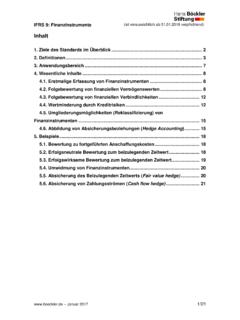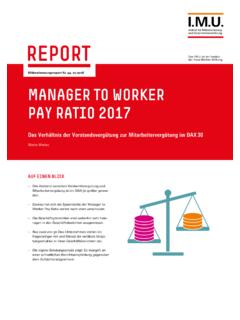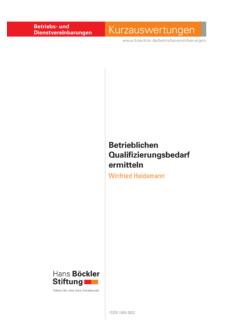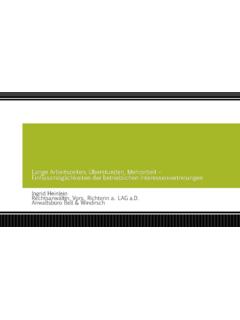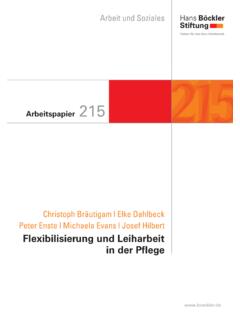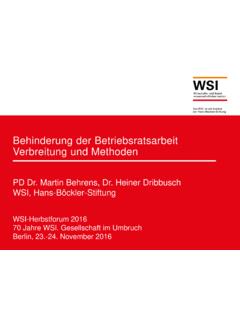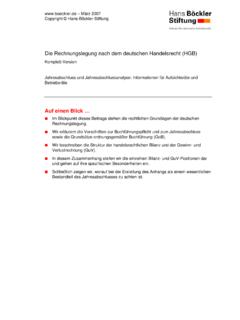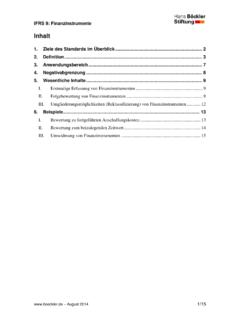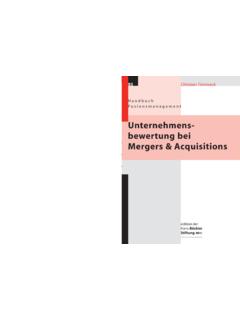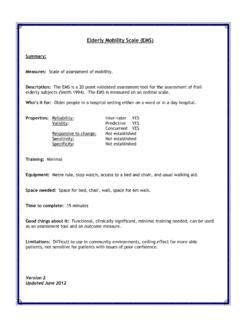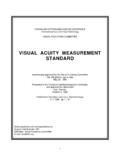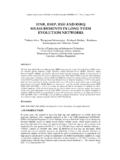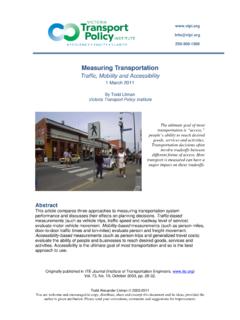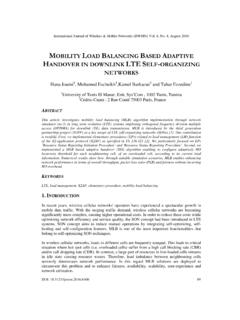Transcription of Determinants of Economic Inequality - The Role of Capital ...
1 Determinants of Economic Inequality - The Role ofCapital MobilityHannes Fauser October 15, 2014prepared for the 18th FMM Conference on Inequality and the future of capitalism AbstractThis paper investigates the relationship between Capital mobility and eco-nomic Inequality in four developed countries, focusing on the post-Bretton-Woods period. It adds to the literature in three ways: A theoretical causallink from the increase in Capital mobility to the rise of income Inequality isderived. The hypothesis claims that increased Capital mobility has, via taxcompetition, contributed to lower taxation of the affluent, thereby increasinginequality.
2 Second, this link is investigated empirically, finding some supportfor the hypothesis, but little evidence for a direct link from financial opennessto income concentration. Third, proposals for further research include refine-ments of Capital control measures and panel estimations of a direct relationshipbetween financial openness indicators and top income shares, in the spirit ofthe empirical financialisation literature. E-mail: This paper is based on the author s Master s Thesiswith the same title. I would like to thank Nikolaus Wolf, Felix Kersting, Volker Daniel and furtherparticipants of the graduation seminar at the Institute of Economic History at Humboldt-Universit atzu Berlin for helpful comments.
3 Financial and immaterial support from the Rosa-Luxemburg Foun-dation, and data access support by the German Research Foundation through the CollaborativeResearch Center 649 Economic Risk at Humboldt-Universit at zu Berlin are gratefully Introduction12 A short historical overview23 Methodological and theoretical Income and wealth concentration .. Capital mobility development and measurement .. Taxation and Capital mobility .. From taxation to Inequality .. Deriving my hypothesis ..134 Empirical Exploring the relationship between Capital mobility and inequalitydirectly .. Feldstein-Horioka indicator .. measures.
4 Measures .. jure indicators .. From Capital mobility to tax competition, further to Inequality .. Wrap-up ..295 Relation to financialisation literature .. Explaining the evolution of Inequality since the 1970s .. Suggestions for further research ..366 Conclusions397 Bibliography41A Appendix461 IntroductionIn his widely acclaimed book Capital in the 21st century , Thomas Piketty (2014)argues that the development of top income shares over the 20th century can beexplained to a large degree by changes in personal income taxation. Precisely, heidentifies the tax cuts that were implemented in the Anglo-Saxon countries sincethe late 1970s, as the source of the surge of income concentration at the top of thedistribution, which has not stopped ever since.
5 In a different strand of literature, Economic historians like Barry Eichengreen (2008) have investigated the history ofthe world financial system, finding that rising Capital mobility has not only playeda major role in the breakdown of the Bretton Woods System, but also for the sub-sequent liberalisation and deregulation of financial markets. As these two develop-ments largely coincide, I attempt to throw an exploratory glance at the relationshipbetween Capital mobility and Economic Inequality in this causes of the rise in Inequality over the last three to four decades are notyet fully understood, and they are subject to heated debate among economists andscientists from neighbouring disciplines alike.
6 I would like to add to this literatureby investigating the role that the increase of Capital mobility has played in this de-velopment, a point that so far received little attention in the empirical (mainstream)literature. In short, my argument features the following narrative: Since the early1960s, Capital mobility has increased in most parts of the world, starting in liberally-oriented developed market economies. It has contributed to the demise of BrettonWoods, which in turn accelerated the increase of Capital mobility , fueled also byadvances in technology. Alongside the spread of neoliberal thinking, this rise againinfluenced decisions to cut top tax rates, as it became easier to shift funds abroadand hence tax competition increased.
7 As both corporate and personal income taxeswere reduced, top earners were able to boost their share of the pie at the expense ofincome groups with less bargaining power over their try to empirically test the hypothesis that Capital mobility has contributed tolower taxation of the rich, thereby increasing Inequality , along two ways: First, Idirectly investigate the evolution of different measures of Capital mobility and topincome shares. Second, I analyse the respective links in the functional chain ofmy hypothesis, from Capital mobility to tax competition, and from taxationto Inequality . Hence, I analyse four high-income countries that are contrasted asbelonging to either the Anglo-Saxon world (the United Kingdom and the UnitedStates) or continental Europe (France and Germany).
8 1 Results indicate that my expectation to find a faster rise of Capital mobility forthe former are not confirmed by the descriptive evidence. Instead, the increase islarge for all four countries, which points to the institutional dimension for possibleexplanations of the observed Inequality differentials. This notwithstanding, findingsof the second part of the empirical analysis underline the validity of the transmissionchannel I propose. This paper remains at a descriptive level when working with thedata. However, I am able to decide on which indicators of Capital mobility aresuitable for further research in a more rigorous way, which is proposed towards remainder of this paper is organised as follows: Section 2 sets out a historicaloverview of the topics considered, covering the distribution of income and wealth,and the development of the international financial system and Capital mobility .
9 Fromthere, chapter 3 develops the theoretical framework of the narrative: After reviewingthe theoretical and empirical literature on top income shares ( ), Capital mobility ( ) and tax competition ( ), I describe the link from taxation to Inequality ( )and derive the hypothesis of my work ( ). Subsequently, it is tested empiricallyin section 4 by following the two paths outlined above: First, the direct relationshipbetween Capital mobility and top income shares is analysed ( ), then the differentsteps along the transmission channel of my narrative ( ). The section is wrappedup by a short discussion of shortcomings and a small summary ( ). Afterwards,chapter 5 relates my analysis to the financialisation literature ( ), discusses possiblefurther explanations for the rise in Inequality ( ) and most importantly describessuggestions for further research ( ), based on the theoretical and empirical analysesof the prior chapters.
10 Finally, section 6 A short historical overviewAs has been clearly demonstrated by the top income share literature (see Atkinsonet al. 2011 for an overview), since the late 1970s the Great Compression of thepost-war era was replaced by the Great Divergence : Starting in the Anglo-Saxoncountries, the distribution of income became much more unequal again. In the last 15years, Piketty and a number of other authors have established a quite comprehensiveliterature on the top income and wealth shares throughout the world. For manydeveloped countries, their data span over a century, starting when a personal incometax or some sort of wealth tax was introduced.
